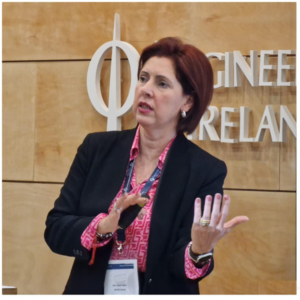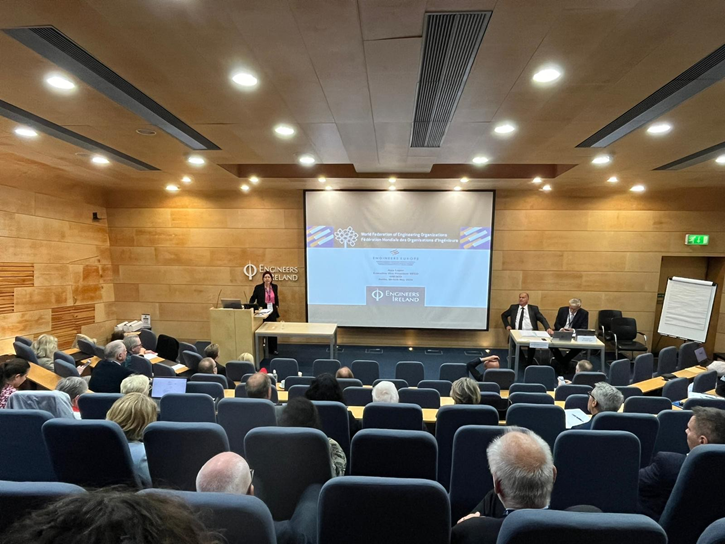

WFEO Executive Vice-President Ania Lopez (Italy) and Member of the Executive Council Alain Jouanjus (France) participated in the Engineers Europe Annual Business Meetings held in Dublin, Ireland, on 30 and 31 May 2024, hosted by Engineers Ireland.
The report of Ania Lopez “Topic to development – Proposal” is available below.
 Introduction
Introduction
Engineering in Europe and for European engineers has always been a priority. The global positioning of European engineers involves the evaluation of various aspects such as quality of education, innovation, professional opportunities and global impact.
During the days of participation in the meetings under the auspices of the Irish Institution of Engineers, there was a moment of exchange with many national members and members of the WFEO Executive Board, an important moment of confrontation for the development of future projects involving engineering.
After an in-depth discussion of the themes of the Engineers for Europe Manifesto, participation in the General Assembly and conferences developed by the member countries, and participation in the technical tables organised, we developed a very concise presentation which was given to the national members attending the meeting, below are the 9 themes developed and presented in the GA.
What can the engineers of Europe and the Engineers’ Organization do together?
The engineers of Europe and the World Federation of Engineering Organizations (WFEO) can collaborate in various impactful ways to address global and regional challenges, advance the profession, and promote sustainable development. Here are some potential areas of collaboration.
1. Advancing Sustainable Development Goals (SDGs)
- Joint Projects: European engineers and WFEO can work together on projects aimed at achieving the United Nations’ SDGs. This includes initiatives in renewable energy, water and sanitation, sustainable cities, and climate action.
- Research and Innovation: Collaborate on cutting-edge research and development projects focused on sustainability, such as smart grid technology, green building practices, and sustainable transportation systems.
2. Enhancing Engineering Education and Professional Development
- Standardization of Education: Work on harmonizing engineering education standards and accreditation processes across Europe and globally, ensuring mobility and recognition of engineering qualifications.
- Continuous Professional Development (CPD): Develop and promote CPD programs that cater to the evolving needs of engineers, focusing on emerging technologies and interdisciplinary skills.

Ania Lopez addressing at the 2024 Engineers Europe Annual Business Meetings
3. Promoting Ethical Standards and Best Practices
- Code of Ethics: Collaborate to establish and promote a universal code of ethics for engineers that upholds integrity, responsibility, and accountability.
- Best Practices Sharing: Create platforms for sharing best practices, lessons learned, and case studies on successful engineering projects across different regions.
4. Addressing Climate Change and Environmental Challenges
- Climate Action Initiatives: Jointly develop and implement projects that focus on reducing carbon emissions, enhancing energy efficiency, and promoting the use of renewable energy sources.
- Disaster Risk Reduction: Work together on disaster risk management strategies, focusing on engineering solutions that improve resilience and reduce vulnerability to natural hazards.
5. Influencing Public Policy and Advocacy
- Policy Advocacy: Collaborate to influence public policy at both regional (European Union) and global levels, advocating for policies that support sustainable engineering practices and the role of engineers in society.
- Public Awareness Campaigns: Launch joint campaigns to raise public awareness about the importance of engineering in addressing societal challenges and promoting sustainable development.
6. Fostering International Collaboration and Networking
- Global Conferences and Workshops: Organize and participate in international conferences, workshops, and forums that bring together engineers from Europe and around the world to discuss pressing issues and share knowledge.
- Exchange Programs: Develop exchange programs and fellowships that allow engineers to work and study in different countries, promoting cross-cultural understanding and collaboration.
7. Building Engineering Capacity in Developing Countries
- Capacity Building Programs: Collaborate on initiatives aimed at building engineering capacity in developing countries through education, training, and technology transfer.
- Infrastructure Development: Work on joint projects that focus on developing essential infrastructure in underdeveloped regions, improving quality of life and economic opportunities.
8. Promoting Innovation and Technology Transfer
- Innovation Hubs: Establish innovation hubs and incubators that support start-ups and innovative engineering solutions to global challenges.
- Technology Transfer: Facilitate the transfer of technology and knowledge from Europe to other regions, ensuring that advanced engineering solutions are accessible globally.
9. Enhancing Professional Recognition and Mobility
- Mutual Recognition Agreements: Develop and implement agreements that recognize the qualifications and professional status of engineers across different regions, promoting mobility and employment opportunities.
- Global Engineer Register: Contribute to a global register of engineers that recognizes and certifies the qualifications and experience of engineers worldwide.
By working together, European engineers and the WFEO can leverage their collective expertise, resources, and networks to make significant contributions to global engineering challenges and promote sustainable development. This collaboration can help ensure that engineering continues to play a vital role in improving quality of life and addressing the pressing needs of society.
Executive summary
European engineers are well positioned in the world due to their high-quality education, innovative skills and significant global impact. They benefit from strong institutional support, opportunities for collaboration and a focus on sustainable and humanitarian engineering. However, we believe that the presence of organisations and colleagues of engineers in Europe needs to grow, only 22 European countries represent the region, our aim is to increase this number through collaborative projects to improve engineering with the support of European engineers.
Report by Ania Lopez, Executive-Vice President of WFEO
For more information:
Report “Topic to development – Proposal” by Ania Lopez
JUN
2024
